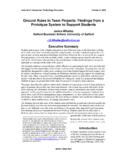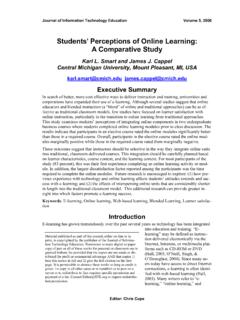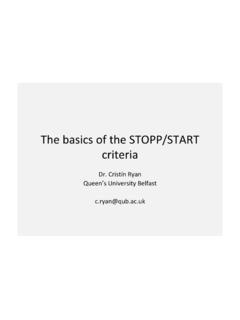Transcription of The Delphi Method for Graduate Research - JITE
1 Journal of Information Technology Education Volume 6, 2007 Editor: Paul Jerry The Delphi Method for Graduate Research Gregory J. Skulmoski Zayed University, Dubai, United Arab Emirates Francis T. Hartman and Jennifer Krahn University of Calgary, Calgary, Canada Summary The Delphi Method is an attractive Method for Graduate students completing masters and PhD level Research . It is a flexible Research technique that has been successfully used in our program at the University of Calgary to explore new concepts within and outside of the information systems body of knowledge. The Delphi Method is an iterative process to collect and distill the anony-mous judgments of experts using a series of data collection and analysis techniques interspersed with feedback. The Delphi Method is well suited as a Research instrument when there is incom-plete knowledge about a problem or phenomenon; however it is not a Method for all types of IS Research questions.
2 The Delphi Method works especially well when the goal is to improve our understanding of problems, opportunities, solutions, or to develop forecasts. In this paper, we pro-vide a brief background of the Classical Delphi followed by a presentation of how it has evolved into a flexible Research Method appropriate for a wide variety of IS Research projects, such as de-termining the criteria for IS prototyping decisions, ranking technology management issues in new product development projects, and developing a descriptive framework of knowledge manipula-tion activities. To illustrate the Method s flexibility, we summarize distinctive non-IS, IS, and Graduate studies Delphi Research projects. We end by discussing what we have learned from using the Delphi Method in our own Research regarding this Method 's design factors and how it may be applied to those conducting Graduate studies Research : i) methodological choices such as a quali-tative, quantitative or mixed methods approach; ii) initial question degree of focus whether it be broad or narrowly focused; iii) expertise criteria such as technical knowledge and experience, capacity and willingness to participate, sufficient time, and communication skills; vi) number of participants in the heterogeneous or homogeneous sample, v) number of Delphi rounds varying from one to 6, vi) mode of interaction such as through email, online surveys or groupware, vii) methodological rigor and a Research audit trail, viii) results analysis, ix) further verification through triangulation or with another sample, and x) publishing of the results.
3 We include an ex-tensive bibliography and an appendix with a wide-ranging list of dissertations that have used the Delphi Method (including brief Research description, number of rounds and sam-ple size). The Delphi Method is a flexi-ble, effective and efficient Research Method that can be successful used by IS Graduate students to answer Research questions in information systems and to rigorously advance the IS body of knowledge. Material published as part of this publication, either on-line or in print, is copyrighted by the Informing Science Institute. Permission to make digital or paper copy of part or all of these works for personal or classroom use is granted without fee provided that the copies are not made or distributed for profit or commercial advantage AND that copies 1) bear this notice in full and 2) give the full citation on the first page. It is per-missible to abstract these works so long as credit is given. To copy in all other cases or to republish or to post on a server or to redistribute to lists requires specific permission and payment of a fee.
4 Contact to request redistribution permission. The Delphi Method for Graduate Research 2 Keywords: Graduate studies, Delphi Method , qualitative Research , quantitative Research , ques-tionnaire surveys. Introduction It continues to be an exciting time to be a researcher in the information systems discipline; there seems to be a plethora of interesting and pressing Research topics suitable for Research at the mas-ters or PhD level. Researchers may want to look forward to see what will be the key information systems issues in a wireless world, the ethical dilemmas in social network analysis, and the les-sons early adopters learn. Practitioners may be interested in what others think about the strengths and weaknesses of an existing information system, or the effectiveness of a newly implemented information system. The Delphi Method can help to uncover data in these Research directions. The Delphi Method is an iterative process used to collect and distill the judgments of experts us-ing a series of questionnaires interspersed with feedback.
5 The questionnaires are designed to fo-cus on problems, opportunities, solutions, or forecasts. Each subsequent questionnaire is devel-oped based on the results of the previous questionnaire. The process stops when the Research question is answered: for example, when consensus is reached, theoretical saturation is achieved, or when sufficient information has been exchanged. The Delphi Method has its origins in the American business community, and has since been widely accepted throughout the world in many industry sectors including health care, defense, business, education, information technology, transportation and engineering. The Delphi Method s flexibility is evident in how it has been used. It is a Method for structuring a group communication process to facilitate group problem solving and to structure models (Linstone & Turloff, 1975). The Method can also be used as a judgment, decision-aiding or fore-casting tool (Rowe & Wright, 1999), and can be applied to program planning and administration (Delbeq, Van de Ven, & Gustafson, 1975).
6 The Delphi Method can be used when there is incom-plete knowledge about a problem or phenomena (Adler & Ziglio, 1996; Delbeq et al., 1975). The Method can be applied to problems that do not lend themselves to precise analytical techniques but rather could benefit from the subjective judgments of individuals on a collective basis (Adler & Ziglio, 1996) and to focus their collective human intelligence on the problem at hand (Linstone & Turloff, 1975). Also, the Delphi is used to investigate what does not yet exist (Czinkota & Ronkainen, 1997; Halal, Kull, & Leffmann, 1997; Skulmoski & Hartman 2002). The Delphi Method is a mature and a very adaptable Research Method used in many Research arenas by re-searchers across the globe. To better understand its diversity in application, one needs to consider the origins of the Delphi Method . The Classical Delphi The original Delphi Method was developed by Norman Dalkey of the RAND Corporation in the 1950 s for a sponsored military project.
7 Dalkey states that the goal of the project was to solicit expert opinion to the selection, from the point of view of a Soviet strategic planner, of an optimal industrial target system and to the estimation of the number of A-bombs required to reduce the munitions output by a prescribed amount, (Dalkey & Helmer, 1963, p. 458). Rowe and Wright (1999) characterize the classical Delphi Method by four key features: 1. Anonymity of Delphi participants: allows the participants to freely express their opinions without undue social pressures to conform from others in the group. Decisions are evaluated on their merit, rather than who has proposed the idea. 2. Iteration: allows the participants to refine their views in light of the progress of the group s work from round to round. Skulmoski, Hartman, & Krahn 3 3. Controlled feedback: informs the participants of the other participant s perspectives, and pro-vides the opportunity for Delphi participants to clarify or change their views.
8 4. Statistical aggregation of group response: allows for a quantitative analysis and interpretation of data. Some (Rowe & Wright, 1999) suggest that only those studies true to their origins that have the four characteristics should be classified as Delphi studies, while others (Adler & Ziglio, 1996; Delbeq et al., 1975; Linstone & Turloff, 1975) show that the technique can be effectively modi-fied to meet the needs of the given study. Perhaps a distinction might be made by using the term Classical Delphi to describe a type of Method that adheres to the characteristics of the original Delphi as summarized by Rowe and Wright (1999). Typical Delphi Process The Delphi process has been comprehensively reviewed elsewhere (Adler & Ziglio, 1996; Delbeq et al., 1975; Linstone & Turloff, 1975), and so we present only a brief overview of how we have used the Delphi in some of our Graduate students' Research projects (Figure 1). Figure 1: Three Round Delphi Process 1) Develop the Research Question - The Research question is derived by a number of ways.
9 For example, it might be co-developed by the student with the help of the supervisor, or the re-searcher s own industry experience often contributes to his interest in the Research area. A review of the literature is also conducted, among other things, to determine if a theoretical gap exists. Often pilot studies are undertaken for numerous reasons: i) identify the problem, ii) conceptualize the study, iii) design the study, iv) develop the sample, v) refine the Research instrument, and, vi) develop and test data analysis techniques (Prescott & Soeken, 1989). Completing a pilot study can also help ascertain the relevance the Research question has to industry; some supervisors strongly favor applied rather theoretical Research . 2) Design the Research - After developing a feasible Research question, we begin designing the Research from a macro to a micro perspective. Typically we review different Research methods (both qualitative and quantitative) and after considering the pros and cons of each, we select the most promising Method (s) to help answer our Research question.
10 The researcher would select the Delphi Method when he wants to collect the judgments of experts in a group decision making set-ting. Both qualitative and quantitative methods can be used in the Delphi process. The Delphi Method may be only one component of the Research project; for example, the Delphi outputs may be verified and generalized with a survey. 3) Research Sample - Selecting Research participants is a critical component of Delphi Research since it is their expert opinions upon which the output of the Delphi is based (Ashton 1986; Bol-PilotStudiesExperienceLiteratureRevi ewResearchQuestionResearchDesignDelphi R1 DesignDelphi R1 PilotDelphi R1 Survey & AnalysisDelphi R2 DesignDelphi R2 Survey & AnalysisDelphi R3 DesignDelphi R3 Survey & AnalysisResearchDocumentation,Verificati on &GeneralizationResearchSamplePilotStudie sExperienceLiteratureReviewResearchQuest ionResearchDesignDelphi R1 DesignDelphi R1 PilotDelphi R1 Survey & AnalysisDelphi R2 DesignDelphi R2 Survey & AnalysisDelphi R3 DesignDelphi R3 Survey & AnalysisResearchDocumentation,Verificati on &GeneralizationResearchSampleThe Delphi Method for Graduate Research 4 ger & Wright 1994; Parente, Anderson, Myers, & O Brien, 1994).



